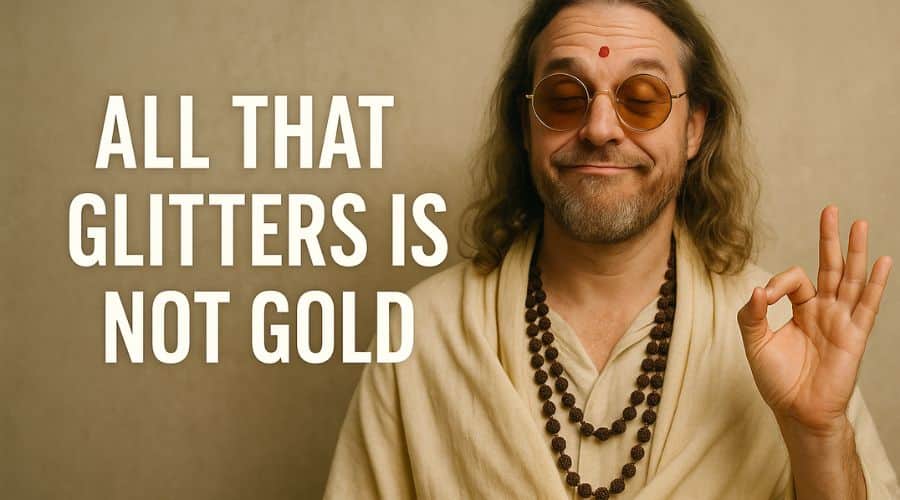When Spiritual Talk Doesn’t Match the Walk

You’ve felt it before. It’s that initial, beautiful spark of connection when you meet someone who speaks your language. They talk of enlightenment, of chakras, of the books and philosophies that cracked your own heart open. A warm feeling spreads through you—I’ve found my people. I’m not alone.
But then, time passes. You watch them move through the world. You see the person who preaches non-judgment make a cutting remark. You see the advocate for universal love act with selfishness. You witness the self-proclaimed guru engage in actions that are dissonant, contradictory, or outright hurtful.
And that’s when the weird feeling kicks in.
It’s a bewildering mix of confusion, disappointment, and a creeping sense of self-doubt. You start to question everything. If their spirituality looks so beautiful on the surface but feels so hollow underneath, what does that say about the path itself? What does it say about you?
This experience isn’t you being overly critical or “just overthinking.” It’s your energetic integrity sounding an alarm. Your intuition is highlighting the chasm between their spiritual words and their worldly deeds. Let’s call this what it is: spiritual incongruence.
The Ego’s Favorite Costume: Spiritual Bypassing
The phenomenon you’re witnessing often stems from something called “spiritual bypassing.” This is the act of using spiritual ideas and practices to sidestep or avoid dealing with unresolved emotional wounds, psychological issues, and all the imperfect parts of being human.
It’s easier to talk about living in the 5D than to feel our anger.
It feels safer to preach about letting go than to actually sit with the raw pain of grief.
It’s simpler to adopt the aesthetic of enlightenment—the mala beads, the Sanskrit phrases, the serene smile—than to do the grueling shadow work required for true integration.
This is the ego’s ultimate magic trick. It can’t stand to be dismantled, so instead, it puts on a spiritual costume. It swaps the identity of “successful professional” or “misunderstood artist” for “enlightened being.” The need to be special, to be right, to be superior, doesn’t vanish. It just puts on a more enlightened disguise.
True spirituality dismantles the ego. Performative spirituality decorates it.
Is It Healing, or a Hiding Place?
This brings us to the most vulnerable and vital question from that original post—one we must all have the courage to ask ourselves: Am I using this path to heal, or am I using it to hide?
Most of us are drawn to a spiritual path because of pain. We seek solace, meaning, and a way to make sense of suffering. This is not a flaw; it is the catalyst. The wound is often what initiates the search for medicine.
The critical distinction lies in what we do next.
Do we use spirituality as a tool to genuinely cleanse the wound, to sit with the discomfort, and to integrate our fragmented parts? Or do we use it as a spiritual band-aid, a way to numb the pain or create a narrative that we are “above it all”?
The first path leads to wisdom. The second leads to the very incongruence that creates that “weird feeling” in ourselves and others.
An Invitation to Deeper Integrity
The moment you start questioning the authenticity of the path—both in others and in yourself—is not a crisis. It is a profound breakthrough. It is your soul calling you into a deeper level of integrity. This is our cue to stop pointing the finger outward and instead, turn the lens of curiosity back onto our own inner world.
Ask yourself with radical honesty and boundless compassion:
-
Am I congruent? Does my internal world of thoughts and beliefs align with my external world of words and actions? Where are the gaps?
-
What is my true motivation? Am I walking this path to connect more deeply with myself and humanity, or am I subtly using it to feel special, pure, or “more evolved” than others?
-
Is my peace authentic or is it performative? Is it a genuine state of being that can coexist with life’s chaos, or is it a fragile state I maintain by suppressing my “messy” emotions and avoiding difficult situations?
-
Am I healing the wound or just covering it? When pain arises, do I use my tools to go into it, or to float above it?
This journey is not about achieving a state of flawless perfection. It is about committing to a state of radical wholeness. It’s about having the courage to acknowledge your shadows, to be honest about your motivations, and to close the gap between what you preach and how you practice, one conscious choice at a time.
The world doesn’t need more spiritual performers. It needs people who are more whole, genuine, and kind. And that transformation starts within.




